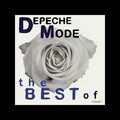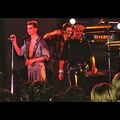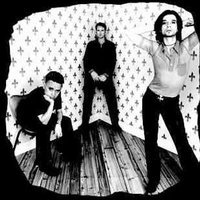While their peerless run of A-sides has encompassed countless recognized classics -- songs that have defined pop music's dark side and alternative's vanguard for the past three and a half decades -- it's also left a lot of buried gems; songs overlooked at the time, or unfortunately forgotten since.
So here's Billboard's take on the Depeche Mode singles that remain the most unappreciated: No "People Are People," no "Strangelove," no Violator, and nothing you'd necessarily expect to hear at a DM gig -- but 10 songs you'd always hold out hope that they found room for.
10. "Fragile Tension" (Sounds of the Universe, 2009)
Accurately named; the synths on the verses buzz exquisitely but nervously over a tinny drum line, sounding ready to burst at any moment. That release comes on the song's soaring chorus, where the guitar rips through the clouds and bathes singer Dave Gahan's vocal in life-affirming (life-threatening?) sunlight: "There's something magical in the air/ Some things so tragic we have to care."
9. "Route 66" (Non-Album, 1988)
U2 spent two whole albums and a documentary chronicling their late-'80s fascination with the American heartland; Depeche Mode took a one-song road trip and called it a day. The electro-rock chug of their "Route 66" is undoubtedly pretty far from what Bobby Troup ever could have envisioned when he wrote the original over 40 years earlier, but the same highway-ready propulsion is there -- even if the musical detours into the band's sexual-roleplaying "Behind the Wheel" single offer interesting implications about just how Gahan & Co. are getting their cross-country kicks.
8. "See You" (A Broken Frame, 1982)
Though it hardly registers as one of their obvious classics now, back in '82 "See You" represented a huge moment for Depeche Mode -- as their first single after the departure of primary songwriter Vince Clarke proved the group was still a commercial force, going to No. 6 in their native U.K. The nocturnal synth pulse and hushed vocals of the song's verse pointed the way to the darker alleys the band would soon pursue, but the harmony-laden chorus was still all classic girl-group: "All I wanna do is see you/ Don't you know that it's true?"
7. "Suffer Well" (Playing the Angel, 2006)
Another momentous single for Depeche Mode, with Martin Gore -- lead songwriter of the group after Clarke's departure -- giving way to singer Gahan as primary scribe, for one of late-career peak LP Playing the Angel's early highlights. The song's thick, low guitar riff is one of their best since "Personal Jesus," and the chorus is classic Depeche Mode, Gore's backing vocals providing invaluable countermelody as Gahan testifies: "I just hang on/ Suffer well/ Sometimes it's hard to tell."
6. "But Not Tonight" (Modern Girls Sountrack, 1986)
In the U.K., "But Not Tonight" was relegated to the underside of the band's "Stripped" single, but it got the A-side in the U.S., where the song led the soundtrack to the mid-'80s romp Modern Girls. The movie tanked, and so did the single, which is too bad -- the song was the last taste of the sprightly synth-pop Depeche Mode would all but leave in the dust with the next year's Music for the Masses, and lyrics like, "Oh God, it's raining/ But I'm not complaining," served as a clever comment on claims that the band's Black Celebration era had gotten overwhelmingly dour.
5. "Love, In Itself" (Construction Time Again, 1983)
The Construction Time Again album added some much-needed funk to Depeche Mode's often rigidly 4/4 formula, leading to inspired results like lead track "Love, In Itself," which paired a thudding, hip-hop-edged beat to an irresistibly chattering faux-horn hook and one of the band's most attention-commanding choruses: "There was a time when all on my mind was love/ But now I find that most of the time, love's not enough/ In itself." Clutch use of the comma in the title, too.
4. "Useless" (Ultra, 1997)
In the hyper-kinetic electro-rock space of 1997 -- which saw the rise of block-rocking British acts like The Prodigy and The Chemical Brothers to action soundtrack go-tos -- the methodical grooving of 4th Ultra single "Useless" was bound to get lost in the shuffle. Shame, because the guitar riff is another of the band's all-time best, and the narcotic bass undertow -- as the song's brilliant Kruder & Dorfmeister remix would place front & center -- makes the resigned futility of the song's lyrics ("Feeling tired and bruised/ With the bitterest taste") absolutely hypnotic.
3. "A Question of Lust" (Black Celebration, 1986)
Maybe the least predictable single in the Depeche Mode discography, veering from Spectorian pop melodrama (the song even counts off by aping the classic "Be My Baby" drum intro) to foreboding darkwave, to near-religious soul rapture, and back again before the end of the first towering chorus ("It's a question of lust/ It's a question of trust/ It's a question of not letting what we've built up crumble to dust!") Evanescence could've done a great cover of it, and so could've Al Green.
2. "Condemnation" (Songs of Faith and Devotion, 1993)
Speaking of unpredictable, few could've seen this gospel ballad off Songs Off Faith and Devotion coming for Depeche Mode, forcing Gahan to scale heights with his throaty pleading that he'd never dared aim for before -- he's since called it one of his favorite vocal performances, understandably. While many cited the band's smash "People Are People" as evidence that white nationalist Richard Spencer had grossly misunderstood the group's central message in calling them "the official band of the alt-right," this hymnal illustrates the band's essential empathy with far greater grace: "If for honesty, you want apologies/ I don't sympathize/ If for kindness you substitute blindness/ Please open your eyes."
1. "Leave in Silence" (A Broken Frame, 1982)
A shimmering and simmering synth-pop mini-epic whose brilliance comes in its relative restraint -- keys sparkle and then dissipate, built-up tension dissolves into instrumental negative space, the title is practically whispered as the chorus climax. It's the rare breakup ballad that attempts to tiptoe out the back door rather than loudly storm out the front, having already had enough of all the drama ("I can't stand this emotional violence!") and fearing another potential backslide ("This'll be the last time/ I think I said that last time"). The lead track on Depeche Mode's second album, "Leave in Silence" forecast the instrumental and emotional complexity they'd soon be regularly capable of -- even essentially predicting the "Never again is what you swore/ The time before" refrain to Violator classic "Policy of Truth" -- and stands today as their most regrettably overlooked classic.







